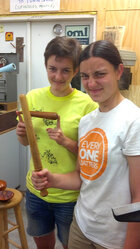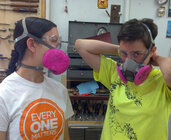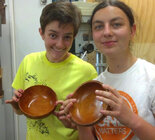Thank you for this opportunity to introduce myself. I am a retired driving instructor and completely new to woodworking. The world of turning fascinates me, but to date, I have yet to accomplish creating a smooth, round blank! I look forward to the tips and advice I can learn from this group. I live an hour's drive from the nearest turning facility to be able to attend classes, so articles and videos are my only teachers. I'd be happy to chat with members closer to me, maybe have a turning get together?
-
February 2026 Turning Challenge: Cookie Jar! (click here for details) -
Congratulations to Chad Eames for "Red Tines" being selected as Turning of the Week for February 23, 2026 (click here for details) -
AAW Symposium demonstrators announced - If the 2026 AAW International Woodturning Symposium is not on your calendar, now is the time to register. And there are discounts available if you sign up early, by Feb. 28. Early Bird pricing gives you the best rate for our 40th Anniversary Symposium in Raleigh, North Carolina, June 4–7, 2026. (There are discounts for AAW chapter members too) For more information vist the discussion thread here or the AAW registration page
-
Welcome new registering member. Your username must be your real First and Last name (for example: John Doe). "Screen names" and "handles" are not allowed and your registration will be deleted if you don't use your real name. Also, do not use all caps nor all lower case.
You are using an out of date browser. It may not display this or other websites correctly.
You should upgrade or use an alternative browser.
You should upgrade or use an alternative browser.
Mark Goulais
- Thread starter Mark Goulais
- Start date
Mark Hepburn
Artist & Chef
Welcome to the forum Mark!
You’ll find some great insights here. I suggest starting out in the “getting started” forum. I would also tell you to ask questions about anything you need to know. I started as less than a novice and what I’ve learned here has been so valuable in my own learning journey.
I noticed that you live south of Fond du Lac. Beautiful area (I lived in Oconomowoc west of Milwaukee years ago).
Best wishes on your turning journey!
You’ll find some great insights here. I suggest starting out in the “getting started” forum. I would also tell you to ask questions about anything you need to know. I started as less than a novice and what I’ve learned here has been so valuable in my own learning journey.
I noticed that you live south of Fond du Lac. Beautiful area (I lived in Oconomowoc west of Milwaukee years ago).
Best wishes on your turning journey!
Thank you for the welcome and tips! Fall is coming - the most beautiful season in WI I think.Welcome to the forum Mark!
You’ll find some great insights here. I suggest starting out in the “getting started” forum. I would also tell you to ask questions about anything you need to know. I started as less than a novice and what I’ve learned here has been so valuable in my own learning journey.
I noticed that you live south of Fond du Lac. Beautiful area (I lived in Oconomowoc west of Milwaukee years ago).
Best wishes on your turning journey!
Thank you for this opportunity to introduce myself. I am a retired driving instructor and completely new to woodworking. The world of turning fascinates me, but to date, I have yet to accomplish creating a smooth, round blank! I look forward to the tips and advice I can learn from this group. I live an hour's drive from the nearest turning facility to be able to attend classes, so articles and videos are my only teachers. I'd be happy to chat with members closer to me, maybe have a turning get together?
Hello Mark!
Turning is a rewarding thing!
First thing: many videos are horrible, some dangerous, some, well, stupid (IMO). People who shouldn't be making videos do. How can you know?
If you haven't, join the AAW. That will give you access to resources including a list of videos that are vetted for usefulness and safety.
In addition, a few hours mentoring with an experienced turner is, IMO, far better than a class or days of YouTube. You get one-on-one instruction with someone to provide tools, equipment, wood, and step-by-step instruction on any aspect of turning. Unlike a class, a good "personal trainer" can devise a plan to fit your goals, demonstrate tools and cuts, provide sharp tools for you to try the cuts yourself, and most importantly, watch every move and make real-time suggestions to on holding and presenting the tools, good foot/leg/arm/hand positions and movements, and correct mistakes before they create a problem.
Where can you find a mentor? The best way is join a turning club, even if you have to drive some distance. Some here drive over an hour and a half one way to club meetings. Besides connecting with a mentor, a club will let you meet turners of all levels of experience, ask questions, learn of and share resources, attend demos in person, and and find out about special classes.
How can you find a club? As at a local woodworking store such as Woodcraft. The AAW web site keeps a list of all the AAW chapters (clubs) and you might find one you don't know about. Contacting the individual clubs in your area might reveal member not far from you who attend meetings and may be willing to carpool. There may even be someone very close willing to invite you to their shop!
Turners are, in general, happy, creative, generous people willing to spend the time to help. All mentoring sessions I know of are in the turner's own shop and protected by insurance.
Each may have their own specialty so our club mentoring list has each volunteer list what they do or like to do the best. Even if you already have goals a mentor can provide different perspectives and might introduce you to something you never imagined doing.
I personally have some strong views and start everyone the same way. I, and some others, believe that learning spindle turning can teach the fine tool that will let you turn ANYTHING. (I can provide references) Many are focused on the glamorous (and easy) path of turning bowls, small and large and bigger, many from green wood. This is a CHEAP way to proceed, since green wood is free in many places. But frankly, once you learn how mount and safely start a bowl, the turning itself, the basic tools, and skills needed are fairly simple and the turning is relatively easy. Some turn bowls, bows, bowls, and not much else. Others love turning hollow forms. I enjoy a variety.
I feel that spindle turning is so important to master that I teach that first, even if a student has never seen a lathe before. We start with the skew chisel and a pre-rounded blank. Once they learn to make consistent planing cuts with the skew (might take 5-10 minutes), I move to the spindle gouge and work on coves, then back to the skew for v-grooves, peeling, and facing cuts, then finally to the spindle roughing gouge and learn to make a turning square round. Then to beads and other things.
After a spindle lesson and practice, the students can make something to take home. Later we start learning "face" turning (bowls, etc).
As an example, and sorry to bore those who've seen these pictures before, these two friends who had never touched a lathe came to my shop for a one-day lesson. In the morning we did the spindle lesson and they both successfully took home something they wanted to make. After a lunch break, we use a practice bowl blank to learn the how to hold and turn a simple bowl, then by the end of the day they both completed nice bowls from cherry to take home!



One now has her own lathe and turns often, the other is in grad school now and perhaps will have time later!
Another EXTREMELY important thing you can learn through the club and mentors is how to sharpen tools. The old woodturning saying is "if you can't sharpen, you can't turn." (This doesn't apply to certain carbide tools which, IMO, are best avoided when beginning.) When I started turning, nearly 25 years ago, I didn't know how to sharpen and had to take my tools to the local Woodcraft store and pay someone $6 each for what was occasionally a poor sharpening job! Far better to acquire some basic sharpening equipment and learn to sharpen yourself. (Some people sharpen several times when turning one piece!)
And hey, if you find yourself on a road trip through TN stop and visit I'll do my best to have you making a smooth, round blank is short order! My fee is a good story or a good joke! If you come in the winter we rarely have snow...
Sorry this is so long, but I tend to overdo things. Any questions, just ask. There are MANY experienced people on this forum quick to offer help!
JKJ
Thank for the information! One can never acquire enough of it. I will look into a AAW Membership.Hello Mark!
Turning is a rewarding thing!
First thing: many videos are horrible, some dangerous, some, well, stupid (IMO). People who shouldn't be making videos do. How can you know?
If you haven't, join the AAW. That will give you access to resources including a list of videos that are vetted for usefulness and safety.
In addition, a few hours mentoring with an experienced turner is, IMO, far better than a class or days of YouTube. You get one-on-one instruction with someone to provide tools, equipment, wood, and step-by-step instruction on any aspect of turning. Unlike a class, a good "personal trainer" can devise a plan to fit your goals, demonstrate tools and cuts, provide sharp tools for you to try the cuts yourself, and most importantly, watch every move and make real-time suggestions to on holding and presenting the tools, good foot/leg/arm/hand positions and movements, and correct mistakes before they create a problem.
Where can you find a mentor? The best way is join a turning club, even if you have to drive some distance. Some here drive over an hour and a half one way to club meetings. Besides connecting with a mentor, a club will let you meet turners of all levels of experience, ask questions, learn of and share resources, attend demos in person, and and find out about special classes.
How can you find a club? As at a local woodworking store such as Woodcraft. The AAW web site keeps a list of all the AAW chapters (clubs) and you might find one you don't know about. Contacting the individual clubs in your area might reveal member not far from you who attend meetings and may be willing to carpool. There may even be someone very close willing to invite you to their shop!
Turners are, in general, happy, creative, generous people willing to spend the time to help. All mentoring sessions I know of are in the turner's own shop and protected by insurance.
Each may have their own specialty so our club mentoring list has each volunteer list what they do or like to do the best. Even if you already have goals a mentor can provide different perspectives and might introduce you to something you never imagined doing.
I personally have some strong views and start everyone the same way. I, and some others, believe that learning spindle turning can teach the fine tool that will let you turn ANYTHING. (I can provide references) Many are focused on the glamorous (and easy) path of turning bowls, small and large and bigger, many from green wood. This is a CHEAP way to proceed, since green wood is free in many places. But frankly, once you learn how mount and safely start a bowl, the turning itself, the basic tools, and skills needed are fairly simple and the turning is relatively easy. Some turn bowls, bows, bowls, and not much else. Others love turning hollow forms. I enjoy a variety.
I feel that spindle turning is so important to master that I teach that first, even if a student has never seen a lathe before. We start with the skew chisel and a pre-rounded blank. Once they learn to make consistent planing cuts with the skew (might take 5-10 minutes), I move to the spindle gouge and work on coves, then back to the skew for v-grooves, peeling, and facing cuts, then finally to the spindle roughing gouge and learn to make a turning square round. Then to beads and other things.
After a spindle lesson and practice, the students can make something to take home. Later we start learning "face" turning (bowls, etc).
As an example, and sorry to bore those who've seen these pictures before, these two friends who had never touched a lathe came to my shop for a one-day lesson. In the morning we did the spindle lesson and they both successfully took home something they wanted to make. After a lunch break, we use a practice bowl blank to learn the how to hold and turn a simple bowl, then by the end of the day they both completed nice bowls from cherry to take home!
View attachment 78694 View attachment 78697 View attachment 78698
One now has her own lathe and turns often, the other is in grad school now and perhaps will have time later!
Another EXTREMELY important thing you can learn through the club and mentors is how to sharpen tools. The old woodturning saying is "if you can't sharpen, you can't turn." (This doesn't apply to certain carbide tools which, IMO, are best avoided when beginning.) When I started turning, nearly 25 years ago, I didn't know how to sharpen and had to take my tools to the local Woodcraft store and pay someone $6 each for what was occasionally a poor sharpening job! Far better to acquire some basic sharpening equipment and learn to sharpen yourself. (Some people sharpen several times when turning one piece!)
And hey, if you find yourself on a road trip through TN stop and visit I'll do my best to have you making a smooth, round blank is short order! My fee is a good story or a good joke! If you come in the winter we rarely have snow...
Sorry this is so long, but I tend to overdo things. Any questions, just ask. There are MANY experienced people on this forum quick to offer help!
JKJ
Welcome to the Forum, Mark!
The best way to get smooth items is sharp tools. Contact your local Woodturners Guild, and you will meet skilled individuals who will show you how to sharpen your tools and different techniques to improve your skills. They will let you know the products that they use to kick up their game. There's so much knowledge out there just waiting for you to explore! Happy Turning & Stay safe!
 ️
️
The best way to get smooth items is sharp tools. Contact your local Woodturners Guild, and you will meet skilled individuals who will show you how to sharpen your tools and different techniques to improve your skills. They will let you know the products that they use to kick up their game. There's so much knowledge out there just waiting for you to explore! Happy Turning & Stay safe!
For $35, you can join the MIlwaukee Area Woodturners and check out their open shop day this Saturday, and meet some of them. 
Welcome, Mark. Check out www.turnawoodbowl.com. He has videos on his site and on YouTube. Lots of articles, too. I found that site invaluable when I was starting out.
